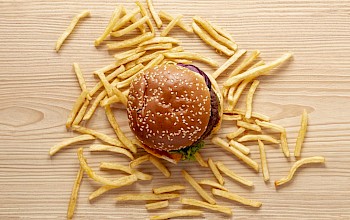Mutton: Calories and Nutrition Analyse
How many calories in mutton?

Nutrition Facts
MuttonServing size:
standard serving size (1 cup) of mutton (134 g) change
5g10g15g20g30g40g50g60g80g100g120g140g160g180g200g220g250g300g350g400g450g500g600g700g800g900g1000g
1oz2oz3oz4oz5oz6oz7oz8oz10oz12oz15oz20oz25oz30oz35oz40oz50oz
Amount Per Serving:
100g of mutton contain about 294 calories (kcal).
Calories per:
ounce
| standard serving size, half cup
To give you an idea, a standard serving size (1 cup) of mutton (134 g) contain about 394 calories.
This is about 20% of the daily caloric intake for an average adult with medium weight and activity level (assuming a 2000 kcal daily intake).
Scroll down for details and nutrition tables.
To visualize how much 394 kcal actually is, keep in mind that the calorie content of mutton is similar to that of, for example:
- 7.5 apples
- 5 glasses of Coca Cola (220 ml glass)
- 4 slices of cheese
- 3.5 slices of bread
- 3 glasses of milk
- 20.5 cubes of sugar
Take a quick look at the tables below for detailed information about mutton nutrition.
100g of Mutton
Nutrition
- Calories294
- Carbs Total0 g
- Dietary fiber0 g
- Fat20.94 g
- Saturated fat8.83 g
- Protein24.52 g
- Water53.72 g
Vitamins
- Vit B1 (Thiamine)0.1 mg
- Vit B2 (riboflavin)0.25 mg
- Vit B3 (Niacin)6.66 mg
- Vit B60.13 mg
- Vit B9 (Folic acid)0.018 mcg
- Vit E0.14 mg
- Vit K0.005 mg
Minerals
- Potassium310 mg
- Magnessium23 mg
- Calcium17 mg
- Sodium72 mg
- Iron1.88 mg
Discover the Nutritional Powerhouse: Mutton
When it comes to choosing meats with a rich flavor and a robust nutritional profile, mutton is often a top choice for many. Known for its distinctive taste, mutton, which is the meat from sheep more than one year old, offers a variety of health benefits. Let's dive into the mutton calories, mutton nutrition, and the balance of protein, fat, and carbs in mutton to understand why it might be a worthy addition to your diet.
Caloric Content and Macronutrients
For those keeping an eye on their caloric intake, it's important to note that a 100-gram serving of mutton contains approximately 232 calories. This makes it a relatively energy-dense food, which is something to consider in the context of your overall dietary goals. However, the nutritional value of mutton extends far beyond its caloric content.
One of the most notable aspects of mutton is its protein content. With around 18 grams of protein per 100 grams, mutton is an excellent source of this essential macronutrient, which is vital for muscle repair, growth, and overall body function. Protein-rich foods like mutton can also be beneficial for weight management, as they help to keep you feeling full and satisfied after meals.
When it comes to fat in mutton, a 100-gram serving contains about 18 grams of fat, of which 12.26 grams are saturated. While mutton does contain a higher amount of saturated fat, it's also a source of monounsaturated and polyunsaturated fats, which can have beneficial effects on heart health when consumed in moderation.
Interestingly, mutton contains virtually no carbs, making it an ideal choice for those following low-carb or ketogenic diets. This absence of carbs in mutton highlights its role as a protein and fat-focused food, suitable for those looking to minimize their carbohydrate intake.
Vitamins and Minerals Galore
Beyond macronutrients, mutton shines in its offering of vitamins and minerals. It's a good source of iron, providing about 2.3 mg per 100 grams, which is crucial for preventing anemia and supporting healthy blood circulation. Mutton also contains zinc (2.97 mg), essential for immune function, wound healing, and DNA synthesis.
Additionally, mutton offers a range of B-vitamins, including vitamin B3 (niacin) at 4.5 mg, which is important for energy production and maintaining healthy skin. The presence of vitamin B6 (0.16 mg) aids in brain health and the creation of neurotransmitters.
Though mutton does not contain vitamin C or dietary fiber, its rich profile of other nutrients, coupled with its high protein and fat content, makes it a valuable meat choice for those looking to diversify their dietary sources of nutrients.
Integrating Mutton into a Healthy Diet
Incorporating mutton into your diet can be a delicious way to enhance your nutritional intake. Whether it's roasted, stewed, or grilled, mutton can be prepared in a variety of ways that highlight its rich flavor. However, due to its high saturated fat content, it's wise to consume mutton alongside a diet rich in vegetables, fruits, whole grains, and other lean protein sources to maintain a balanced and heart-healthy diet.
In conclusion, while mutton may be higher in calories and saturated fat than some other meats, its impressive array of nutrients, including high-quality protein, essential vitamins, and minerals, make it a nutritious option for those looking to enjoy a diverse and balanced diet. As with all foods, moderation and variety are key to reaping the benefits of mutton while maintaining overall health and wellness.
How many calories are there in 1, 2, 3, or 5 servings of mutton?
- Standard serving size (1 cup) of mutton (134 g)394 kcal
- Half cup of mutton (67g)197 kcal
- Ounce (oz) of mutton83 kcal
- Half of medium size servings of mutton197 kcal
- Small size serving of mutton (107g)315.2 kcal
- Big size mutton (174g)512.2 kcal
- Two medium size servings of mutton788 kcal
- Three medium size servings of mutton1182 kcal
- Four medium size servings of mutton1576 kcal
- Five medium size servings of mutton1970 kcal
Compare mutton:
mutton vs beef, mutton vs chicken, mutton vs veal, mutton vs pork, mutton vs venison , mutton vs lamb chop, mutton vs duck meat, see all compares of mutton.

Similar calories number have:
See also:
Read this:
- How many calories do Fritos have?
- Calories in a half of corned beef hash
- Calories in whole corned beef hash
- Calories for one, two or more corned beef hash
- Calories in tablespoon of corned beef hash
- How many carbs (carbohydrates) in freeze pop?
- How much fat in thai tea?
- How much protein in condensed milk?
- What is weight of pork fried rice?
- Cranberry salad calories per ounce (oz)
- Torte cake calories per serving size



Add comment